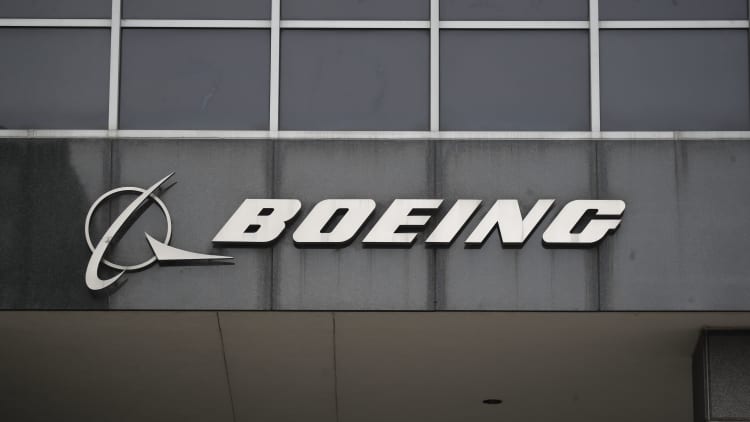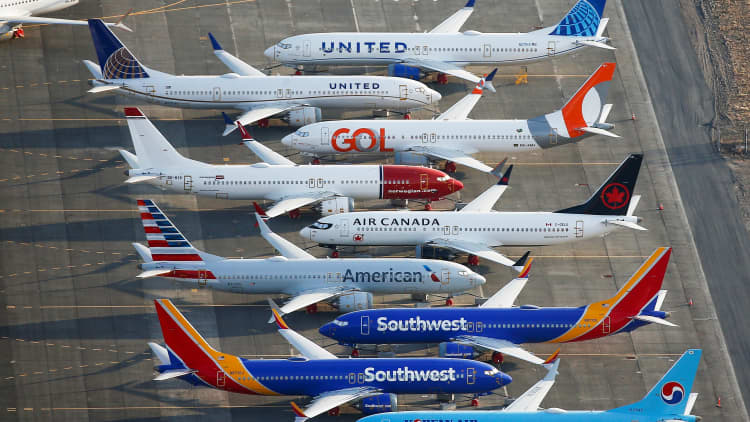Boeing on Friday said it is working to address concerns outlined in Indonesia's final report on the crash of a Lion Air 737 Max jet in October last year that killed all 189 people on board.
A second crash less than five months later in Ethiopia killed all 157 people on board.
The report, released earlier Friday by Indonesia's National Transportation Safety Committee, faulted Boeing, saying the planes needed better cockpit design. It also said stronger oversight was needed by the U.S. Federal Aviation Administration and other agencies.
Much focus for both crashes has been the Boeing-designed anti-stall system known as the Maneuvering Characteristics Augmentation System, or MCAS. Pilots in the two crashes struggled against the system which repeatedly pushed the planes' noses down until their final, fatal dives.
In its response to the report from Indonesian regulators, Boeing said it was redesigning the Angle of Attack sensors which inform the anti-stall system so that they would now turn the system on, only if both sensors agree.
Boeing added the MCAS would now only activate once to "erroneous" AoA data and would "always be subject to a maximum limit than can be overridden with the control column."
The U.S. plane-maker said the changes would prevent the flight conditions that caused the Lion Air crash from ever happening again.
Boeing is also updating crew manuals and pilot training.
Indonesia's damning report
In their report, Indonesian regulators said the MCAS system had repeatedly forced the plane's nose down, meaning pilots had to repeatedly apply 103 pounds of strength in an ultimately doomed attempt to right the plane.
The regulators concluded that: "The design and certification of the MCAS did not adequately consider the likelihood of loss of control of the aircraft."
It said there was evidence that a critical sensor hadn't been calibrated properly by a repair shop in Florida, nor had it been tested by Lion Air maintenance staff.
The report found that that Lion Air failed to ground the jet after faults were identified on earlier flights.
Crew were also criticized. The report said the Lion Air captain didn't adequately brief the first officer when handing over control just before the plane lost control.
FAA reply
The FAA said Friday that it also welcomed the recommendations from Indonesian investigators.
In a statement, the it said it would carefully consider the report's findings, as well as other recommendations, as it continued its ongoing review of how Boeing plans to change the operation of the 737 Max.
"As we have previously promised, the aircraft will return to service only after the FAA determines it is safe," said the statement.
The FAA added that the accident report was "a sober reminder" that the first priority of regulators should always be safety.
The agency also revoked the operating certificate of Xtra Aerospace, a maintenance facility in Miramar, Fla. that performed work on a sensor that was implicated in the crash of the Lion Air flight. The FAA said it started its investigation into the company in November last year, just after the Lion Air 610 crash, and concluded it failed to keep adequate records among other violations.
Costs to Boeing

Boeing has said it still expects the FAA to lift the worldwide flight ban on the planes in the fourth quarter of 2019.
Earlier this week, Boeing said production costs for the 737 Max had risen by $900 million in the third quarter. This was on top of the $2.7 billion in extra production costs it had announced earlier this year
The full cost of redeveloping the 737 Max and compensating airlines for their losses may not be known until there is a global consensus on the plane's safety.
In September 2019, the European Union Aviation Safety Agency said it wanted a triple-agreement of AoA sensors rather than Boeing's proposed upgrade to a dual agreement.
Building a third sensor on every 737 Max would inevitably delay the plane's return to the skies and raise production costs enormously.
Boeing shares were down 1.3% in morning trading on Friday. As the one-year anniversary of the Lion Air crash approaches, the stock is around 3% lower than exactly 12 months ago.
-CNBC's Leslie Josephs contributed to this report.
READ MORE: The year that changed Boeing: Airplane maker struggles to regain footing since first 737 Max crash



